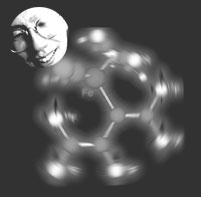Dedication
Introduction
Dan Ariely
Walter Bender
Steve Benton
Bruce Blumberg
V. Michael Bove, Jr.
Cynthia Breazeal
Ike Chuang
Chris Csikszentmihályi
Glorianna Davenport
Judith Donath
Neil Gershenfeld
Hiroshi Ishii
Joe Jacobson
Andy Lippman
Tod Machover
John Maeda
Scott Manalis
Marvin Minsky
William J. Mitchell
Seymour Papert
Joe Paradiso
Sandy Pentland
Rosalind Picard
Mitchel Resnick
Deb Roy
Chris Schmandt
Ted Selker
Barry Vercoe
Ike Chuang
My work lies at the junction of physics and computer science: two fields that have collided spectacularly in recent years, nowhere more vividly than with the birth of quantum computation and quantum information.
The fundamental quest of physics has traditionally been a search for universality: what is the smallest set of equations and constants from which everything in the universe can be derived? Our theories, from classical mechanics to quantum physics, the Standard Model, and string theory, have encompassed phenomenal tracts of mankind's knowledge. But these theories have gaping holes (aside from their lack of gravity)...how do they explain, say, laughter?
 Computer science is driven by a similar quest for universality, but unlike physics, it happily sacrifices microscopic dissimilarities in exchange for macroscopic similarities. According to the Church-Turing thesis, the fundamental tenet of this field, any universal computational machine can efficiently simulate another. One universal laughing machine is equivalent to another. No physics is required—reality is mathematical! However, it now appears that this attempt to abstract computation away from the physical world is impossible, and the Church-Turing thesis must speak to the laws of physics, because of the advent of a new field: quantum computation.
Computer science is driven by a similar quest for universality, but unlike physics, it happily sacrifices microscopic dissimilarities in exchange for macroscopic similarities. According to the Church-Turing thesis, the fundamental tenet of this field, any universal computational machine can efficiently simulate another. One universal laughing machine is equivalent to another. No physics is required—reality is mathematical! However, it now appears that this attempt to abstract computation away from the physical world is impossible, and the Church-Turing thesis must speak to the laws of physics, because of the advent of a new field: quantum computation.
Computers are machines that must obey the laws of physics, and a quantum computer differs from the usual in that it cleverly exploits the laws of quantum mechanics, and not just mechanics and electromagnetism. I first encountered this idea in 1988, reading a marvelous paper by Richard Feynman, where he pointed out how these are in equivalent to ordinary computers, because classical machines cannot efficiently simulate quantum mechanics. Such was my fascination with this idea that I decided to build a quantum computer. Fourteen years later, we have simple quantum processors, and believe arbitrarily large and reliable quantum computers can be made. And quantum information, built on classical information theory, is maturing into a global language for understanding and teaching quantum physics.
Still, there remains the mystery of laughter. Is there a lesson to be learned from the history of quantum information? Perhaps what we seek is not really a grand unified theory of physics, or a universal Turing machine. Maybe, as von Neumann did, we should turn to seek a theory for something greater: life itself. That's a challenge not to laugh at.
The future holds great promise for such challenges. Just as physics has a great deal to learn from "Being Digital," and computer science is growing in response to quantum physics, new ideas will continue to be found at the ragged edge of existence. Success requires creative, rapid jumps between different fields and different modes of thought. I am tremendously excited about this future at the Media Lab, and look forward to shaping a unique environment where the physical sciences can explore new avenues for growth and find worlds for such visions to flourish.
First computer: IBM 370 punch-card system with COBOL